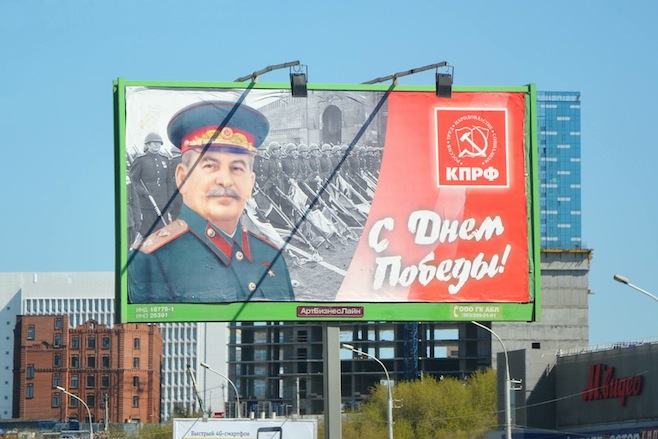The 9th of May was the date that celebrations were held all over Russia commemorating the defeat of the Germans by Russian forces in World War II, or as it is known to most Russians, The Great Patriotic War. To commemorate and celebrate this event, hundreds of billboards featuring the face of the Russian leader during the war, Josef Stalin, were erected in many Russian towns and cities, especially Novosibirsk, Russia’s third-largest city.
The billboards were erected by the Community Party in Novosibirsk to honour Stalin as he was the commander in chief of the Russian forces at the time of their victory. The Communist Party released a statement indicating that war veterans were pleased that they were, “restoring historical justice.”
A recent poll in Russia revealed that many Russians now believe that Stalin was not, in fact, the monster that he has been made out to be. The actual number of people who were killed by Stalin’s regime is a matter of debate, but there is no question that the numbers are huge, in the order of millions.
The Russian leadership is slowly but surely rehabilitating Stalin’s image and he is now portrayed as a ‘tough leader’, who guided the Russians through industrialisation, implemented the winning strategy over the Germans in World War II and stood up to the West at the end of the war.
The poll, conducted by the Levada Centre, has revealed that 45 percent of Russians believe that the ‘sacrifices sustained by people under Stalin were justified by the country’s great goals.’ The last time this question was polled was in October 2008 when only 27 per cent believed this statement to be true. Only 20 per cent of Russians now view Stalin in a negative light.
An explanation for this turn around comes from Nikita Petrov, a member of the Russian rights organisation, Memorial. He told an interview with the Daily Mail that this is, “a sign of unlearned history lessons. It comes from a reluctance to look at yourself and honestly admit that we took the wrong path and that our country committed a host of crimes against its own people and the people of neighbouring states‘. Petrov believes that this new belief originates from the Russian leadership who wish for a return to the days when Russia was a world superpower and this desire has filtered down through all levels of society until now it is believed by the man in the street.
The Russian president, Vladimir Putin, has not come out strongly one way or the other. He has been quoted as saying that state-sponsored terror is ugly and cannot be condoned but also clearly indicated that Stalin’s regime should not be compared to that of Nazi Germany. In a recent televised phone-in program, he stated, “the Stalin regime never aimed to exterminate entire ethnic groups.”
The modern view of Stalin and his contribution to Russia was clearly brought into focus by the erection of the banners and billboards featuring his face. To the members of Russia’s human rights organisations this new fervour around Stalin is concerning to say the least, as is the whitewashing of history. An analyst from the Gazeta on-line newspaper wrote, “as long as history in Russia is presented as a chain of triumphs and victories over enemies, without an honest attitude towards our forefathers’ mistakes and crimes, we will have no safeguards against a repeat of the purges.” This belief is no doubt worrying, and could be said to bode ill for the future.
Source: The Daily Mail
